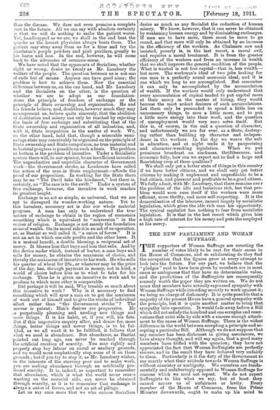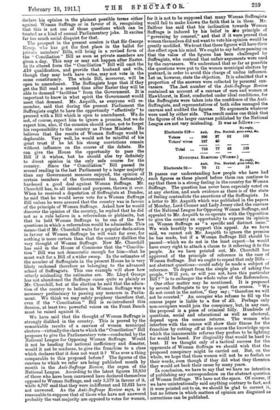THE NEW PARLIAMENT AND WOMAN SUFFRAGE.
T"supporters of Woman Suffrage are counting the number of votes likely to be cast for their cause in the House of Commons, and so exhilarating do they find the occupation that the figures grow at every attempt to look into the future. For our part, we believe that the " pledges " said to have been given by members are in most cases so ambiguous that they have no determinable value, and the predictions of the Suffragists are consequently scarcely worth the paper they are written on. We do not mean that members have actually expressed sympathy with Woman Suffrage while intending secretly to work against it; we bring no charge of dishonesty. It is quite possible that a majority of the present House have a general sympathy with the principle, but it is quite another matter to bring that sympathy into operation. It would fade away before a Bill which did not satisfy the hundred and one scruples and reser- vations that exist side by side with a sincere enough attach- ment to the cause of Woman Suffrage. There is the widest difference in the world between accepting a principle and ac- cepting a particular Bill. Although we do not suppose that any member has been dishonest in giving assurances, we have always thought, and will say again, that a good many members have trifled with the question; they have not appreciated the fact that Woman Suffragists are perfectly sincere, and in the result they have behaved very unfairly to them. Particularly is it the duty of the Government to say exactly what their attitude towards Woman Suffrage is without casuistry or ambiguity. We ourselves are funda- mentally and unfalteringly opposed to Woman Suffrage for reasons which we need not repeat. We do not expect Suffragists to like what we say, but at least they cannot accuse us of unfairness or levity. Every member of the House of Commons, from the Prime Minister downwards, ought to make up his mind to declare his opinion in the plainest possible terms either against Woman Suffrage or in favour of it, recognizing that this is not one of those questions which can be treated as a kind of annual Parliamentary joke. It excites far too much social disquiet for that. The prospect in the present session is that Sir George Kemp, who has got the first place in the ballot for private members' Bills, will bring in a revised form of the " Conciliation " Bill as soon as private members are given a day. This may or may not happen after Easter. In its altered form the " Conciliation " Bill will omit the £10 qualification, and provide that husband and wife, though they may both have votes, may not vote in the same constituency. The whole Bill, moreover, will be open to amendment. The Suffragists hope that if they get the Bill read a second time after Easter they will be able to demand " facilities " from the Government. It is important to know in what spirit the Government would meet that demand. Mr. Asquith, as everyone will re- member, said that during the present Parliament the Suffragists ought to have the opportunity " effectively " to proceed with a Bill which is open to amendment. We do not, of course, expect him to ignore a promise, but we do expect him, also, if the occasion should arise, not to forget his responsibility to the country as Prime Minister. He believes that the results of Woman Suffrage would be deplorable. Very well, he would not be mindful of his great trust if he let his strong convictions remain without influence on the course of the debate. He can give the House the opportunity to pass the Bill if it wishes, but he should also try definitely to direct opinion in the only safe course for the country. Since the " Conciliation" Bill passed its second reading in the last Parliament by a larger majority than any Government measure enjoyed, the opinion of certain members of the Government has, fortunately, hardened a good deal against Woman Suffrage. Mr. Churchill has, to all intents and purposes, thrown it over. When he received a deputation of Suffragists at Dundee, he said that he would never vote for a Woman Suffrage Bill unless he were assured that the country was in favour of the principle of Woman Suffrage. Asked how he would discover the opinion of the country, he replied that he did not as a rule believe in a referendum or plebiscite, but that he held Woman Suffrage to be one of the few questions in which a referendum would be admissible. This means that if Mr. Churchill waits for a popular declaration in favour of Woman Suffrage he will wait for ever, for nothing is more certain than that the country dislikes the very thought of Woman Suffrage. Now Mr. Churchill has said in the House of Commons that the " Concilia- tion " Bill was not democratic enough for him—that he must wait for a Bill of a wider sweep. In the estimates of the number of Suffragists in the present House he is very likely reckoned therefore as belonging to the advanced school of Suffragists. This one example will show how utterly misleading the estimates are. Mr. Lloyd George has not abandoned the Suffrage cause quite so plainly as Mr. Churchill, but at the election he said that the educa- tion of the country to believe in Woman Suffrage was a necessary preliminary to passing any measure in Parlia- ment. We think we may safely prophesy therefore that, even if the " Conciliation " Bill is re-introduced this Session, at least two powerful voices on the Front Bench must be raised against it.
We have said that the thought of Woman Suffrage is strongly disliked in the country. This is proved by the remarkable results of a canvass of women municipal electors—virtually the class to which the " Conciliation" Bill proposes to give the Parliamentary vote—conducted by the National League for Opposing Woman Suffrage. Would it not be heading for national inefficiency and disaster, would it not be madness, to give the franchise to a class which declares that it does not want it ? Was ever a thing comparable to this proposed before ? The figures of the canvass to which we refer are being published month by month in the Anti-Suffrage Review, the organ of the National League. According to the latest figures 18,850 of those who have been canvassed have declared themselves opposed to Woman Suffrage, and only 5,579 in favour of it, while 4,707 said that they were indifferent and 12,621 have not answered. As the Anti-Suffrage Review says, is it reasonable to suppose that of those who have not answered probably the vast majority are opposed to votes for women, for it is not to be supposed that many Woman Suffragists would fail to make known the faith that is in them. Mr. Balfour has said that his inclination towards Woman Suffrage is induced by his belief in like principle of " governing by consent," and that if it were proved that women themselves did not want to vote his opinion would be greatly modified. We trust that these figures will have their due effect upon his mind. We ought to say before passing on that the value of the figures has been challenged by Suffragists, who contend that unfair arguments were used by the canvassers. We understand that so far as possible the questions were put to the women municipal electors by postcard, in order to avoid this charge of undue influence. Let us, however, state the objection. It is admitted that a proportion of the answers were collected by personal can- vassers. The last number of the Anti-Suffrage Review contained an account of a canvass of men and women at Hawkhurst, in Kent, conducted under ideal conditions, for the Suffragists were taken into the confidence of the Anti- Suffragists, and representatives of both sides managed the canvass and audited the figures. No arguments whatever were used by either side. The result makes one think that the figures of the larger canvass published by the National League are not very misleading. It was as follows :— No reply,
Electorate 615— Anti. Pro. Neutral. bone away, 40.
Voters ... 396 87 52 133 Voters' wives 357 40
Total ... 753 77 58 133
— —
MUNICIPAL Etreroas (Woirsie.)
No reply,
Anti. Pro. Neutral. gone away, Ie.
Electorate 95— 70 11 — 13
It passes our understanding how people who have had such figures as these placed before them can continue to say that there is a strong feeling in the country for Woman Suffrage. The question has never been expressly voted on at any election, and such evidence as there is of the state of feeling contradicts the assertions of the Suffragists. In a. letter to Mr. Asquith which was published in the papers of Monday, Lord Cromer and Lady Jersey cited the canvass of the National League for Opposing Woman Suffrage, and appealed to Mr. Asquith to co-operate with the Opposition to give the country an opportunity to express its opinion on Woman Suffrage as " a specific and distinct issue." We wish heartily to support this appeal. As we have said, we cannot ask Mr. Asquith to ignore the promise he has made, but if a Woman Suffrage Bill should be passed—which we do not in the least expect—he would have every right to attach a clause to it referring it to the people. As we have pointed out, Mr. Churchill has approved of the principle of reference in the case of Woman Suffrage. But we ought to repeat that only Bills— not abstract questions—could safely be made a subject of reference. To depart from the simple plan of asking the people, " Will you, or will you not, have this particular Bill ? " is to endanger the whole value of the Referendum.
One other matter may be mentioned. It is proposed by several Suffragists to try to upset the census. " We do not count in the nation," they say ; " therefore we will not be counted." An occupier who -refuses to fill up the census paper is liable to a fine of £5. Perhaps only non-occupiers would join the conspiracy, but, in any case, the proposal is a piece of criminal folly. Hundreds of questions, social and educational as well as electoral, depend upon the census returns. The women who interfere with the census will show their fitness for the franchise by cutting off at the source the knowledge upon which the innumerable reforms they profess to be fighting for would be based. For illogicality that would be hard to beat. If we thought only of a tactical success for the opponents of Woman Suffrage we should wish that the proposed conspiracy might be carried out. But, on the whole, we hope that these women will not be so foolish as their words, even though if they did what they threaten they would set back their cause by many years. In conclusion, we have to say that we have no intention of publishing any correspondence on the abstract question of Woman Suffrage. We have not the space. Of course, if we have unintentionally said anything contrary to fact, and it were pointed out to us, we should be glad to correct it, but no letters in which matters of opinion are disguised as corrections can be published.







































 Previous page
Previous page